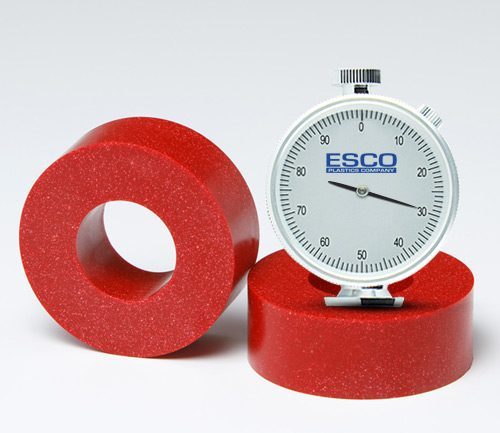Urethane Hardness Data
Durometer is the ASTM standard (and a handheld instrument) used for measuring the hardness of rubber, plastic, and most nonmetallic materials. Hardness, measured on a Shore A or D scale, is a material’s resistance to surface deflection. Harder materials may be more opposed to friction or erosion, however, they’re also less flexible. The more resistance found in a material, the higher the hardness value indicated on the durometer.
Durometer is expressed numerically:
- 10A – 50A – Very soft urethanes best suited for shock absorption
- 50A – 80A – Soft urethanes used for particle impingement applications
- 80A – 90A – Mid-range urethanes of medium resilience used for abrasive applications due to the longevity of the material
- 90A – 95A – Hard urethanes that work best in impact and sliding types of abrasion applications
- 60D – 75D – Very hard urethanes that work well in bearing and bushing application
How Is A Material’s Hardness Actually Measured?
A shore hardness gauge or durometer (resembles a round tire pressure gauge) has a pin on a spring protruding from one end and measures the resistance of a material to indentation. The gauge is placed against the surface of a urethane part, and the urethane resists the pressure being applied by the pin in the gauge. The pressure on the pin translates to a hardness reading found on the dial of the gauge. The point of the highest reading on the dial under pressure is the hardness of the urethane part being tested.
Why Durometer Matters.
Polyurethane delivers excellent performance across a hardness range that spans from rubber bands (low hardness) to bowling balls (high hardness). Its durometer range is broad. Many applications – from shock absorbers to tires – take advantage of polyurethane’s unique combinations of performance and hardness.
Hardness is an indicator of a material’s value. But hardness alone should not be the sole specifier of a polyurethane’s overall function. Different polyurethane formulations can have the same hardness yet have a very different set of functional or performance properties. Therefore, do not rely on hardness alone to specify a polyurethane.
At ESCO Plastics we measure hardness to ASTM D2240 testing standards.
To ask questions or get more information on urethane product technical data for your projects, contact the experts at ESCO Plastics, 281-443-3710

